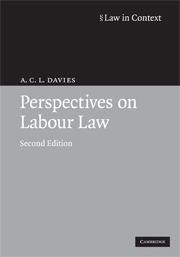Book contents
- Frontmatter
- Contents
- Preface
- Acknowledgements
- Table of statutes
- Table of statutory instruments
- Table of EU legislation
- Table of international instruments
- Table of cases
- Abbreviations
- PART I
- PART II
- 5 Who is protected by employment law?
- 6 Working time
- 7 Discrimination
- 8 Wages
- 9 Dismissal
- 10 Collective representation
- 11 Trade union membership
- 12 Industrial action
- What next?
- Index
8 - Wages
Published online by Cambridge University Press: 28 January 2010
- Frontmatter
- Contents
- Preface
- Acknowledgements
- Table of statutes
- Table of statutory instruments
- Table of EU legislation
- Table of international instruments
- Table of cases
- Abbreviations
- PART I
- PART II
- 5 Who is protected by employment law?
- 6 Working time
- 7 Discrimination
- 8 Wages
- 9 Dismissal
- 10 Collective representation
- 11 Trade union membership
- 12 Industrial action
- What next?
- Index
Summary
In the days of collective laissez-faire, a book on labour law would not have contained a chapter on wages. Workers' pay was seen as pre-eminently a matter for collective bargaining between trade unions and employers. Even when the law did intervene, through the creation of Wages Councils to determine wage rates for the lowest paid, this was viewed as a substitute for collective bargaining rather than as a new approach to pay determination. Nowadays, however, the position is very different. English law regulates pay in two ways. First, the National Minimum Wage Act 1998 (NMWA) seeks to ensure that all workers receive a minimum hourly rate for their work. This is intended to improve the working conditions of the lowest-paid workers. Second, the Equal Pay Act 1970 (EqPA) and the anti-discrimination legislation seek to ensure that workers who make an equal contribution to the firm are paid equally, and that no artificial distinctions are made on the basis of sex, race, religion and so on. The discussion of equal pay in this chapter will concentrate primarily on equality between the wages of women and men, because this has received most attention in the cases and the literature. However, it is important to bear in mind that unequal pay may affect other groups too, particularly the members of certain ethnic minorities.
Neoclassical economists are hostile to legal regulation of wages. They argue that it is the function of markets to set wages, so any interference with the usual interplay of market forces will be counterproductive.
- Type
- Chapter
- Information
- Perspectives on Labour Law , pp. 139 - 156Publisher: Cambridge University PressPrint publication year: 2009



